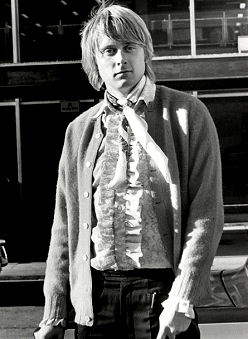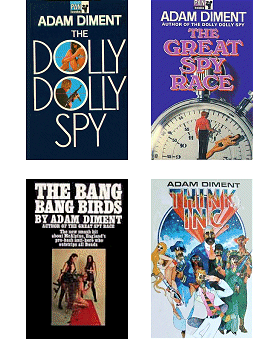Sixties
City presents
a wide-ranging series of
articles on all aspects of the Sixties, penned by the creator of the iconic
60s music paper Mersey
Beat
|
Sixties
City presents
a wide-ranging series of
articles on all aspects of the Sixties, penned by the creator of the iconic
60s music paper Mersey
Beat
|
|||||
|
 |
British
spy movies continued to be popular throughout the Sixties with James Bond,
Harry Palmer and even David Niven (who’d appeared as Sir James Bond in ‘Casino
Royale’) as Jason Love in ‘Where The Spies Are.’ Writer Adam Diment suddenly
found himself in the spotlight in 1968 when he decided to create a spy more
in keeping with the mood of the permissive Sixties. His hero, Philip McAlpine, made his debut in ‘The Dolly Dolly Spy’, which became a best-seller and brought Diment a great deal of publicity in the national press, which took interest in a new, young secret agent who smoked pot. The Daily Mirror commented: "The most modern hero in years. He’s hip, he’s hard, he likes birds and, sometimes, marijuana.” The Sunday Mirror wrote: “Philip McAlpine, the latest Instant Hero of Fiction. He is the contemporary Bond. McAlpine is a Secret Service agent, too. He also has an obsessive interest in sex. But about there they part company.” McAlpine was the hero of four books and ‘The Dolly Dolly Spy’ was followed the same year by the publication in March of ‘The Great Spy Race’ and in September of ‘The Bang Bang Birds'. Young, blonde-haired Diment seemed the ideal successful Sixties man. Atticus in the Sunday Times wrote: “Adam Diment is 23; his hero, Philip McAlpine, is based on himself. That is to say he’s tall, good-looking, with a taste for fast cars, planes, girls and pot. One of the most interesting characters in the book (‘The Dolly Dolly Spy’) is his loathsome British Secret Service chief, Quine, who talks camp and calls McAlpine ‘luv.’ “Quine,” says Diment, “is God. A sort of non-caring vicious God. He’s the Establishment rolled into one. He’s all authority.” Writing in the New York Times in November, 1967, Anthony Boucher commented, “Adam Diment, who is only 23, is a happy answer to my recent plaint about the lack of really young writers in the suspense field. ‘The Dolly Dolly Spy’ introduces Philip McAlpine, an agent who smokes hashish, leads a highly active sex life, kills vividly, uses (or even coins) the latest London slang and still seems a perfectly real (and even oddly likeable) young man rather than a reflected Bond image. His first effort as a double agent, kidnapping a monster of the Waffen S.S. is slow in starting, but well plotted and brightly coloured. |
 |
 |
|
Article
Text
UK
web hosting by
|